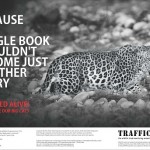TRAFFIC’s Latest Ad: “‘WANTED ALIVE’: Help Save Our Big Cats”
With Asia's big cats increasingly under threat in the wild, TRAFFIC's latest public service advertisement campaign reminds people that these felines are "Wanted Alive” in their natural habitat!
Campaign posters feature the four Asian big cats–Tiger, Leopard, Snow Leopard and Clouded Leopard–all of them threatened by illegal trade. Strong messages carried by the campaign ask readers to do their part to ensure the four species continue to live in the wild.
TIMES OOH has provided generous support for the campaign by offering hoarding sites and digital screens to TRAFFIC in India for display.
Large banners have been put up at the DND Flyway in Delhi, airports, metro stations, and other strategic locations across the country.
Illegal wildlife trade threatens the survival of Asian big cats in the wild. Besides existing markets, new emerging ones, such as those in Myanmar, are worsening the situation. The threat was highlighted at the recently concluded Global Tiger Recovery Program Stocktaking meeting in New Delhi from 15-17 May 2012, attended by senior government officials from all 13 Tiger range countries.
TRAFFIC’s new campaign underlines the imperative need to protect Asian big cats in the wild. Tiger, Leopard, Snow Leopard and Clouded Leopard are found in a variety of habitats across India but are being killed for their body parts which are smuggled through porous borders to clandestine international markets.
The Snow Leopard from the Himalayan Mountains and the high altitude cold deserts to the north is hunted for its fur. The little known Clouded Leopard inhabits the dense jungles of north-eastern India and is also largely hunted for its beautiful coat, patterned with cloud like markings. The future of the Leopard is equally precarious.
The Tiger is the largest cat species in the world which is threatened by illegal trade in its bones and skins. The bones are valued in traditional East Asian medicines, and the skin used by wealthy individuals to decorate their houses, tents or clothes. TRAFFIC estimates that body parts of nearly 500 Tigers have been recovered from illegal traders in India during 2000-2011. Many more Tigers may have been killed and smuggled out, undetected.
